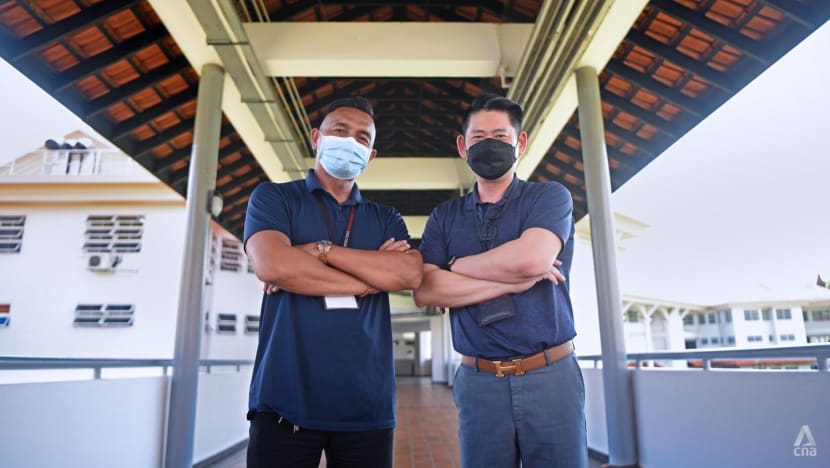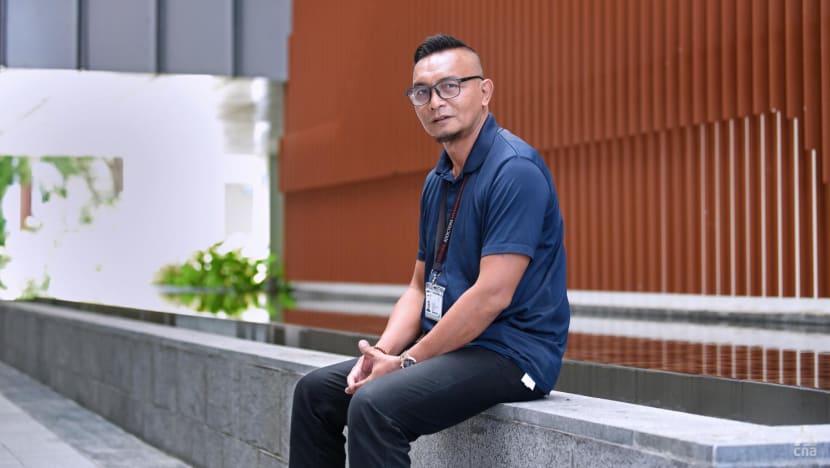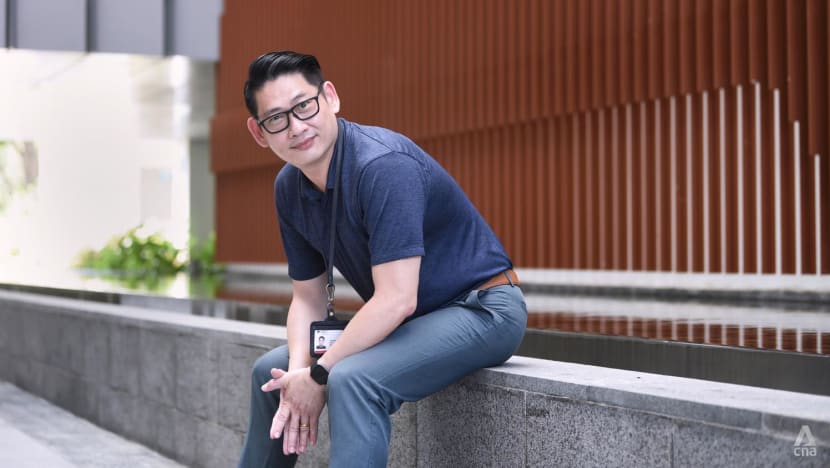He spent his youth in jail, then got his life back. He now helps other ‘special ones’ fight addiction
Relapses are normal and an opportunity to learn. A peer support specialist and an assistant counsellor in the National Addictions Management Service talk about turning their darkest moments into hope for others in CNA Insider’s new podcast series, Heavy Duty.

Peer support specialist Mohammed Sufian Mohd Noor (left) and assistant counsellor Thomas Koh of the National Addictions Management Service. (Photo: Gaya Chandramohan/CNA)
SINGAPORE: Mohammad Sufian Mohd Noor was in his 40s when he quit drugs. By then, he had been in and out of the drug rehabilitation centre and prison for almost 20 years.
In a sobering moment of “self-reflection”, he realised that his youth had been spent, or misspent, in prison. “I (felt) I had no life,” he says. “I wanted my life back.”
Now aged 51, Sufian is helping others struggling with addiction as a peer support specialist in the Institute of Mental Health’s (IMH’s) National Addictions Management Service (Nams).
His job is to provide encouragement, instil hope and share his personal experience with addicts in recovery. That lived experience helps him to connect more easily with people he calls his peers.
“I’ve been in their shoes,” he says in the second episode of CNA Insider’s new podcast series, Heavy Duty, which features people who see the dark side of human nature at work.
“Those in our circle, I call the special ones. What I mean is, if we go outside … (and look around), we can pinpoint who’s an addict, who’s a pusher. People outside our circle (wouldn’t) know.”
Listen to the former addicts helping others break the chain:
Exposure to drugs in his childhood through his father, brushes with the law, multiple relapses, winning back his family’s trust and the long, hard road to getting his life back on track — Sufian has lived through these and more.
He is also open about his past and embodies what Nams hopes its peer support specialist programme can do.
“Peer support specialists play an important role in addiction treatment. The process of (them) sharing their lived experiences helps to establish trust and support with the patients,” says Nams senior counsellor and head of allied health Samuel Chua.
“These are motivating elements in a person’s recovery as the journey can otherwise appear bleak and filled with challenges.”
‘ANY PRISON I GO, I SEE YOUR FACE’
Sufian knows how important it is to have a listening ear and a cheerleader on the recovery journey.
Five years into his final, nine-year stint in prison, a prison officer sparked something in him. He was 38 years old, and they had first met when he was in his early 20s.
The officer nagged at him and said, “Any prison I go, I see your face”, Sufian recalls.
All he wanted at the time was for the officer to buzz off, so he issued a challenge in response: “If you really want me to change, you recommend me for student (sic).”
He was not serious about studying — he merely thought it would give him privileges in prison.
The officer handed him a form, but his fellow inmates jeered, and one of them tore it up. To Sufian’s own surprise, he went to get a new form and filled it in, this time in private.
His application was accepted.
He struggled in the beginning, and he failed his first tests miserably. “My teacher asked me, ‘Why are you so happy? You failed your maths, you only got nine (marks),’” he recounts. “But I told my teacher that in the past … I could only get zero or one.”

With some one-to-one lessons, however, Sufian aced his subjects by the end of the year and got a transfer to Kaki Bukit Prison School to take his N levels.
The encouraging environment gave him extra motivation. “Sometimes I joked with my friends that if my mum saw me doing this, she’d cry because I never (studied so hard) before,” he says.
He scored three distinctions — which made him shed tears, despite his macho exterior — and continued his studies with a Nitec course in electronic and computer networking.
He was allowed to spend the final six months of his prison term at a halfway house, and this also helped to transform his outlook. “There, we were taught to be positive,” he says.
There were posters on the walls reminding him, for instance, to show care and concern, communicate and take responsibility. He tried to practise one philosophy each day. “It’s quite hard to practise; it takes time because human beings are creatures of habit,” he says.
These days, however, his friends and family are struck by his positivity. His friends will remark, “Wah, now the words coming from your mouth (are) all good things, no more bad things”, he cites.
“I’m glad to hear that because at least I’ve done something new,” he adds.
He has tried to turn positive thinking into action since his release in 2012. His father, who introduced him to the world of drugs when he was in primary school, was released from prison over a year ago and lives with him now.
Sufian made sure he was there for him and for his third brother, who was released about three years ago.
Some relatives, when told his father was doing well, have replied, “No lah, for how long only?” He disagreed with them politely but also told his father to prove to others that his past was behind him.
Trust, or the lack of it, is also an issue that people in recovery face.
Sufian himself took two years after his final release from prison to win back his family’s trust. The day he knew he had done so was when he arrived late at a relative’s house for prayers for a deceased uncle.
His relatives waited for him to arrive after work before they started — relatives “who didn’t want to look at my face in the past”, he says, because the old drug-fuelled Sufian used to steal when he went to others’ houses.
So when some peers share their concern about their parents distrusting them, he will respond: “You come out of detox for one or two weeks, (and) you expect them to trust you?
It’s not easy. We’ve hurt them a lot already, so we just have to accept it.”
His conversations with them are not a one-way process. He makes a point of letting them speak their mind and make their own decisions. “I want the decisions (on their plans) to come from them, not from me,” he says.
This, too, stems from his days as a drug user, when people would condemn him whenever he voiced his ideas. “This time around, as a peer support specialist, I’ll allow my peers to … express what they want. I’m there to allow them to ventilate,” he says.
A JOY LIKE ‘STRIKING LOTTERY’
Sufian is currently the only peer support specialist in Nams and one of 14 at the IMH who work alongside psychiatrists, nurses and allied health professionals. The IMH’s other peer support specialists are deployed in places such as the Department of Mood and Anxiety.
Besides him, Nams has four other staff with first-hand experience of addiction. They are in counselling roles and include Thomas Koh, an assistant counsellor who was the first peer support specialist Nams hired in 2017.

In Nams’ two-week inpatient programme, persons in recovery go through detoxification, then rehabilitation. Sufian says his peers’ cravings may still be “quite high”, while Koh, 46, says some of them can be manipulative.
“To be an addict in Singapore … if you aren’t street smart, within weeks you’ll be in jail,” says Koh, who took to alcohol and substance abuse to escape a dysfunctional home environment in his youth. “As a counsellor, when someone’s trying to manipulate you, it’s time to draw that boundary.”
He practises “tough love” and is firm with those who ask for financial help, for instance.
While he says his job is not dark, it is certainly serious. It is fairly common to see patients relapse, but he and Sufian see it not as a sign of failure but an opportunity to learn.
The best part of the job, of course, is seeing people get well. “That joy is like striking lottery,” says Koh.
When asked if he ever worries about falling into addiction again, his reply is “yes and no”. There is no guarantee against a relapse, but it is preventable, he says. For him, counting his blessings and keeping selfish behaviour in check are key.
“If I continue to live my life healthily, take care of my mental health, I won’t relapse all of a sudden,” adds Koh, whose eyes turned yellow and limbs swelled at the height of his abuse of substances like alcohol, painkillers, sleeping pills and codeine.
One thing he did differently the last time he emerged from rehab in 2014 was this: He lived a humble, thrifty life for almost a year instead of rushing back to work, where stressors would have triggered him to relapse.
He also practised honesty, which was put to the test when he met the woman he would marry. The first month after he asked her out was difficult. “I couldn’t tell (her all) I was going through the first day we met,” he says.
“If you tell any girl you’re a drug addict, they’ll run very far. If you tell the person you’re a divorcee, a bankrupt, you can’t even see (how far they run) with binoculars.”
It took a month before Koh slowly opened up to her about his past. She did not dash for the exit, and they now have two children.
He was working in sales for a food company when the National Council of Social Service’s peer support specialist programme and the role in Nams came up.
In 2017, he grabbed the opportunity to make the switch. Sufian did the same early last year after he had worked for nine years for the voluntary welfare organisation that ran the halfway house where he once stayed.
Besides fatherhood — Sufian has five children aged four to 18 — both men are pursuing their interests. Koh is doing a master’s degree in counselling, while Sufian, who has a diploma in social service, runs an external support group with ex-colleagues on weekends for people with addiction and their family members.
His journey has been made possible in part by a society that is more open to second chances, believes Sufian. “In the past, it was harder for (the community) to accept people like us, but nowadays Singaporeans are quite open,” he said. “I really grab (this opportunity) — I treasure it.
“So far, (my journey) has really hurt, but there’s no regret in me because it makes me who I am now.”
Listen to how Mohammad Sufian Mohd Noor and Thomas Koh build rapport with persons in recovery on Heavy Duty here. This CNA podcast series is about people whose jobs deal with the dark side of human nature, and life lessons they have learnt. New episodes on Friday.

















